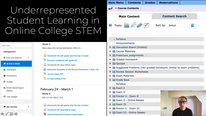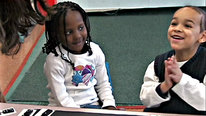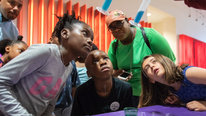- Nathanial Brown
- https://sites.psu.edu/stemdiversitylab/
- Professor of Mathematics
- Presenter’s NSFRESOURCECENTERS
- Pennsylvania State University
- Lindsay Palmer
- Graduate student
- Presenter’s NSFRESOURCECENTERS
- Pennsylvania State University
Inclusive Instructor Behaviors
NSF Awards: 1937617
2021 (see original presentation & discussion)
Undergraduate
At the undergraduate level, calculus is a notorious weed-out class for many STEM majors, particularly among underrepresented students. In 2017 the National Academy of Sciences highlighted three variables -- sense of belonging, self-efficacy, and growth mindset -- because (a) they are associated with student outcomes like grades or persistence and (b) they are all malleable, hence impacted by environmental events such as instructor behaviors. In the STEM Diversity Lab we are studying things university math instructors do or say that convey to students a sense they do/don't belong and can/can't succeed in math. Our focus is on the experiences of women and students of color as they remain critically underrepresented in STEM fields. The ultimate goal is to create more equitable and inclusive learning environments and this research could inform professional development trainings for instructors.
Related Content for Inclusion and Math Class
-
 2018A Focus on Girls' Math Identity for Brighter Futures
2018A Focus on Girls' Math Identity for Brighter Futures
Merle Froschl
-
 2021Racial Equity in the STEM Math Pathway in Community Colleges
2021Racial Equity in the STEM Math Pathway in Community Colleges
Helen Burn
-
 2018Workplace Contexts for Math and Communication Preparation
2018Workplace Contexts for Math and Communication Preparation
Benjamin Zwickl
-
 2021Underrepresented Student Learning in Online College STEM
2021Underrepresented Student Learning in Online College STEM
Nigel Bosch
-
 2021AAAS-IUSE Leveraging this Moment to Transform STEM Education
2021AAAS-IUSE Leveraging this Moment to Transform STEM Education
Thomas Veague
-
 2018The Road to Persistence in STEM: HBCUs in Action
2018The Road to Persistence in STEM: HBCUs in Action
Shabnam Brady
-
 2022A PolyTechnic PASSION for Student Success in STEM
2022A PolyTechnic PASSION for Student Success in STEM
Victoria Bhavsar
-
 2017Hands-On Life Science Using Live Fish
2017Hands-On Life Science Using Live Fish
Valerie Butler
Playlist: Inclusive Mathematics Classrooms
-
 2022Math for All: Understanding How Diverse Students Learn
2022Math for All: Understanding How Diverse Students Learn
Babette Moeller
-
 2021Supporting Equitable Participation and Access
2021Supporting Equitable Participation and Access
Jonee Wilson
-
 2021Middle Grades Mathematics Lessons for Multilingual Learners
2021Middle Grades Mathematics Lessons for Multilingual Learners
Johannah Nikula
-
 2021Inclusion and Math Class
2021Inclusion and Math Class
Nathanial Brown
-
 2019Fractional Reasoning: Students with Learning Disabilities
2019Fractional Reasoning: Students with Learning Disabilities
Jessica Hunt


Mesut Duran
Professor of Technology
I really enjoyed watching the video, and the research topic studied. I wonder if you could provide some more info about how the focus group was selected. Thanks, Mesut
Lindsay Palmer
Graduate student
Hi Mesut,
We are glad you enjoyed the video! We recruited undergraduate students enrolled in the calculus sequence at Penn State. We screened participants for eligibility before participation. Focus groups of students were designed so that we had groups that consisted of all women, all people of color, and all majority group members. We designed groups this way so that underrepresented students might feel more comfortable speaking about their unique experiences.
Mesut Duran
Professor of Technology
Hi Lindsay: Thank you for your reply, and for providing additional info about focus group selection, this is very helpful. --Mesut
Neela White
Project Director
Hi Penn State Team! Thank you for this video submission. I really enjoyed hearing directly from the students. Did you find that the students experienced the same support/or lack of support from their instructors while virtual learning was in place? Thanks and best of luck, Neela
Travis York
Lindsay Palmer
Graduate student
Hi Neela,
Thanks for your comment! This study was conducted before the emergency transition to remote learning. However, we do have an available pre-print of some preliminary findings about STEM students perspectives of their instructors and universities during the pandemic: https://osf.io/preprints/socarxiv/f6jkx/
Neela White
Project Director
Hi Lindsay, thank you for this link to the preliminary findings. I will take a look at it. Great job!
Alexander Rudolph
Professor of Physics and Astronomy
I liked your video's focus on having students read out comments from the focus group. Could you summarize your overall findings from the focus group? Were there themes that emerged? How might you connect these types of comments to outcomes in the class?
Lindsay Palmer
Graduate student
Hi Alexander,
Sure thing! What we found is that students had clear ideas of what were positive and negative behaviors that were shared across groups. So, we did find themes common to all groups. However, we found that what students felt were most important or valued the varied given their background. For example, one theme was related to interpersonal skills. The interpersonal behaviors of their instructors was something that was thematically represented across all groups. Students mentioned both positive interpersonal interactions (e.g., being empathetic to students concerns) and negative ones (e.g., being condescending). For underrepresented group members, they felt that instructors who "engaged everyone" was an important interpersonal skill -- but this was hardly discussed among majority group members. So, while we found themes that emerged across groups -- we found that majority/underrepresented students valued components of the thematic content in different ways.
Travis York
Super exciting work! Previous research on student perceptions of teachers has indicated that there are racial and gendered dynamics involved in student's perceptions of their faculty; particularly for women of color faculty. How will your work take these dynamics into account in ways that support URG Faculty in understanding how the embodiment of their roles interact with student perceptions and experiences?
Lindsay Palmer
Graduate student
Hi Travis,
Thank you for asking this question! To make students more comfortable to participate in the focus groups, we didn't ask them to provide us with details about their instructor. Students were really concerned about confidentiality and whether we could identify the instructors they were discussing. However, we are using our focus group data to create items for an externally valid scale to examine this phenomena more broadly. As a part of this work, we are considering ways we can use this instrument to understand students' experiences in the classroom as well as consider bias in student evaluations towards URG faculty and teaching assistants.
Kelly Costner
Lindsay:
Wondering if this means you're developing a survey...
Also thinking about how written data might inform development of those items. I love the use of focus groups because you get outcomes that are greater than the sum of the parts (participants) due to the social interaction. I'm impressed, too, by the way you designed the groups to consist of rather homogeneous participants. That's probably the opposite of my thinking on focus group recruitment in every case, so it's given me something to consider for the future.
But for those more negative perceptions in particular, I wonder if some people might be more willing to reveal in written narrative. When I teach elementary math methods, I start the term by having the teacher candidates write their "mathematical autobiography" with a focus on how their teachers from PK to present made them feel about mathematics. Those stories have been very revealing, and I'm not sure all of them would talk about it out loud in a group--or even one-on-one. So, just wondering if there are any written narratives from students informing this work so far or if that mode might factor in at some point.
I can't wait to see what comes from your group on this project!
Lindsay Palmer
Graduate student
Hi Kelly,
Your use of written narratives is really fascinating! I would love to hear more about it and think about this in a college classroom.
We do plan to develop a survey with our focus group data! We have several reasons for doing so ourselves and I also love the point you brought up about how we might get more candid responses from participants.
Thank you for your comment! We appreciate it.
Shandy Hauk
There are a few things out there about the use of reflective narratives among college mathematics learners (including some of my own work :)...
Hauk, S. (2005). Mathematical autobiography among college learners in the United States. ALM International Journal 1(1), 36-56.
Krause G.H., Maldonado L.A. (2019) Our Linguistic and Cultural Resources: The Experiences of Bilingual Prospective Teachers with Mathematics Autobiographies. In: Bartell T., Drake C., McDuffie A., Aguirre J., Turner E., Foote M. (eds) Transforming Mathematics Teacher Education. Springer, Cham. https://doi.org/10.1007/978-3-030-21017-5_12
Lawler, B. R., & Gargoretzi, E. C. (2017). Mathematical Autobiography as a Window into Sociopolitical Teacher Identity. In Smith, W. M., Lawler, B. R., Bowers, J., & Augustyn, L. (Eds.). Proceedings of the sixth annual Mathematics Teacher Education Partnership conference. Association of Public and Land-grant Universities.
Marcia Gumpertz
Great video! This project resonated with my husband and he shared it with me. I will share it with the faculty in our Statistics and Mathematics departments.
Lindsay Palmer
Graduate student
Hi Marcia,
Thank you so much!
Sandra Laursen
Great use of student voices in the video. Their comments certainly elevate themes I've heard from students in our group's work. The harder part will be training ourselves out of these behaviors (I'm imagining classrooms where students are all issued a pet training clicker, ha... ).
I look forward to learning more about this work in the future!
Lindsay Palmer
Graduate student
Hi Sandra,
I love the clicker training analogy-- thank you for your comment!
Paola Sztajn
So important to see this work in higher education! I was also glad to see you build on what we know form research in K-12 math instruction.
Lindsay Palmer
Graduate student
Hi Paola,
Thank you! We are excited by the work in K-12 instruction and happy to learn from it.
Lauren Goff
Great video! This project speaks to me personally. I am so encouraged to see this self-awareness and motivation to become more inclusive at the college level. Looking forward to hearing more about this!
Lindsay Palmer
Graduate student
Hi Lauren,
Thank you for your comment! We will continue to speak to these issues and hope that the momentum will grow.
Jonee Wilson
Very interesting work! This idea of belonging and care is something that comes up all of the time in the work VEAR-MI is doing at the K-12 level. So it makes sense that it would be important in the post-secondary context as well! I love that you all are asking students about their experiences (centralizing their voices and their stories).
Lindsay Palmer
Graduate student
Hi Jonee,
Thank you! I agree it is so important to elevate and center students voices when discussing classroom equity. I loved learning about the work being done by the VEAR-MI team to create more equittable STEM participation in your video! The way your rubrics connect theory and teaching practices is really fascinating and inspiring for college contexts. Thank you for your comment!
Caroline Ebby
Thanks for sharing this work. It is so important to be looking at these issues in college-level mathematics instruction. In teaching preservice teachers in a masters program, I find I am working to undo a lot of the damage that has been done in college-level mathematics courses that make students feel that they are not capable of doing math, much less teaching it. As others have pointed out, there is so much to be learned from the work being done in K-12 education, particularly with respect to growth mindset and supporting productive struggle. I am curious about whether you plan to use your findings to provide training or professional development for instructors?
Lindsay Palmer
Graduate student
Hi Caroline,
I agree with your comment that there is so much to be learned from the work in K-12 education and we are grateful for it as we explore it as we examine equity in college classrooms! We do aim to use this work to create interventions and pedagogical trainings for college-level instructors.
Nigel Bosch
Thanks for doing this valuable work!
I see in the project description that it is motivated by three constructs (sense of belonging, self-efficacy, and growth mindset), but it seems like the focus groups could potentially turn up anything including ideas that don't correspond to these categories. How much have the focus groups aligned with these three expectations so far, and similarly have they revealed anything surprising?
Jeremy Roschelle
Very effective video -- from your initial self-presentation to the insights directly from students on their experience. I hope you are successful in spreading what you learn far and wide!
Further posting is closed as the event has ended.